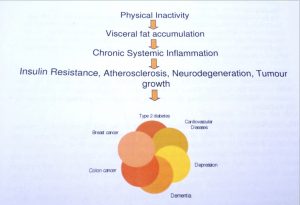Senescent Cells, Inflammation, Obesity and Disease

Obesity, chronic inflammation and modern disease have all been unambiguously linked together. People who are obese have elevated markers of inflammation and suffer from increased rates of diabetes, heart disease, dementia and cancer.
Recent research has pointed towards excessive cellular senescence cells as being at least a partial culprit for the increase in inflammation, DNA damage and age-related disease that comes with obesity. Cellular senescence is a natural and necessary cellular process that occurs when cells cease dividing with age in an effort to maintain tissue homeostasis and limit tumor progression. This is a normal protective mechanism that occurs all the time as a part of our immune system.
However, excessive long-term senescence resulting from chronic cell damage seems to be a strong driver of age-related disease. Senescent cells create a pro-inflammatory microenvironment by secreting hundreds of cytokines like interleukin-6, interferon, and TNF. These substances create an inflammatory environment that damages surrounding cell tissue structure contributing to disease generation.

In healthy immune system or body will clear away senescent cells via a self-eating process called, “autophagy.” However, in an unhealthy body marred by poor lifestyle choices like excessive caloric intake, lack of physical activity and lack of sleep our body struggles to clear away damaged cells leaving them to hang around and leach off inflammatory materials to damage surrounding tissues thereby increasing our likelihood of age-related diseases. In fact, some of the highest accumulations of senescent cells are found stored in body fat, hence why obesity is so strongly linked to inflammation and diseases.
With this in mind it’s important to think about lifestyle modifications as tools to promote autophagy and improve health at the cellular level.
🔹Exercise: Recent findings indicate that exercise is a potent tool to help mediate cellular senescence and obesity-related inflammation. Researchers studying the relationship between diet, exercise and senescence found that when they fed mice a fast food diet they were able to not only significantly increase body fat but also induce cellular senescence and inflammation. However, when they introduced consistent exercise they were able to significantly reduce the inflammatory markers related with to an increase in body fat. This is believed to occur not only because of the reduction in body fat but the increase in cell autophagy that occurs following intense exercise.
➡️Accumulate a minimum of 30 minutes of mild to intense physical activity daily. Be sure to include both strength training AND aerobic exercise in your exercise weekly regimen.
🔹Sleep: Sleep is the time when we clean and restore the tissues in our body. Our circadian rhythm sets the cleaning schedule for our entire body based on the times that we sleep and wake. Researchers have shown that individuals who undergo fragmented sleep have disruptions in their autophagy schedule in the hippocampus, the region of the brain most affected by cellular decline in dementia and Alzheimers.
➡️Try to get 7-9 hours of sleep per night. Do your best to maintain consistency sleep/wake times, avoid blue lights/stimulants prior to bed and sleep in a cool, dark room to ensure good sleep QUALITY.
🔹Fasting: Just as excessive caloric intake can be limit autophagy, mild caloric restriction can increase autophagic behavior of the immune system. Research has shown that time restricted eating can alter circadian driven autophagy due to feeding driven changes in circulating insulin.
.➡️Try incorporating intermittent fasting 3-4 days per week. 16-hour fasting window followed by 8 hour feeding window. This can help to regulate your blood sugar and allow the body to undergo periods of autophagy.
Small but consistent changes to lifestyle can go a long way to changing large, long-term health outcomes. Try incorporating the habits above and focus on consistency.
As Dan John says “A little and often over the long haul.
-Kevin